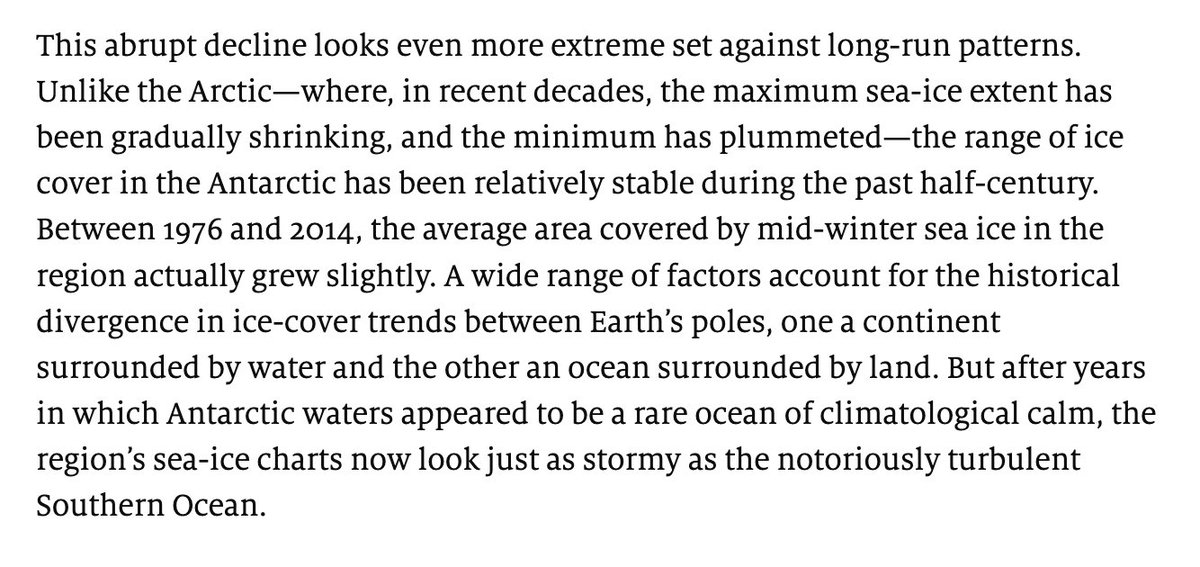For #AsteroidDay, some thoughts about the threat and the history of addressing it.
tl;dr Don't worry about the asteroids; worry a bit about the way science works.
tl;dr Don't worry about the asteroids; worry a bit about the way science works.
So: there was a time in the early/mid 1980s when a very few people had begun to worry about the threat of asteroid impacts, but no-one has started to do anything about it.
Their worries were focused on the possibility that the impact of a large asteroid (a body with a diameter >1km) would create something like a nuclear winter -- a smaller version of the dinosaur-killing apocalypse 66m years ago which might kill a quarter of Earth's population.
With the help of an amenable Congressional representative, the late great George Brown, and despite (or perhaps because of) a certain fractious heterogeneity, this community was crucial to what became the Spaceguard survey.
Their story is told in this excellent #oralhistory by David Chandler @_dlc_, a piece I was truly delighted to commission for #AsteroidDay 2008 and which I remain very fond off #oralhistory
nature.com/articles/45311…
nature.com/articles/45311…
(If you have access, that piece works better as a pdf)
Having played my own small role in chronicling that story as it happened, I find myself amazed by two things.
Having played my own small role in chronicling that story as it happened, I find myself amazed by two things.
One is that it worked.
The Spaceguard survey was based on the idea, since borne out, that it was possible to estimate the size of the population of near-Earth asteroids, and thus to predict how many remained to be discovered.
The Spaceguard survey was based on the idea, since borne out, that it was possible to estimate the size of the population of near-Earth asteroids, and thus to predict how many remained to be discovered.
At the beginning of the survey maybe 10% or so of the big near-Earth asteroids capable of causing a global catastrophe had been discovered. By the end of the 2000s more than 90% of them had.
Happily, none of them posed any sort of century-scale danger. That meant that the chances of a nuclear-winter-type event due to a previously undiscovered asteroid had been slashed.
And the risk due to a previously discovered asteroid remained zero.
And the risk due to a previously discovered asteroid remained zero.
Alan Harris wrote about this success in the same 2008 #AsteroidDay issue of Nature.
nature.com/articles/45311…
nature.com/articles/45311…
Here is the key graphic.
Green is the risk as it appeared before the survey started, dominated by the big asteroids (right hand side) that can cause nuclear winters.
Red is the residual risk in 2008, after most of the big asteroids had been found.
Red<<Green. Big success. W00t!
Green is the risk as it appeared before the survey started, dominated by the big asteroids (right hand side) that can cause nuclear winters.
Red is the residual risk in 2008, after most of the big asteroids had been found.
Red<<Green. Big success. W00t!

In the years since there have been a lot more discoveries.
Data compiled by Harris and colleagues in 2017 showed that there were then fewer than 5 asteroids larger than 2km in diameter still to be found in near-Earth orbits, and maybe a couple of dozen between 1km and 2km.
Data compiled by Harris and colleagues in 2017 showed that there were then fewer than 5 asteroids larger than 2km in diameter still to be found in near-Earth orbits, and maybe a couple of dozen between 1km and 2km.
That meant the two bigger red bars in the 2008 graphic were a lot smaller, and the rest of the right-hand-side red was basically gone.
The data are in table 2-1, here
nasa.gov/sites/default/…
The data are in table 2-1, here
nasa.gov/sites/default/…
Data collection has only improved since then, and the lack of any announcement shows that it hasn't turned anything up.
The risk landscape has thus been utterly transformed.
The risk landscape has thus been utterly transformed.
That leads to the second thing.
In 2015 I went to a meeting about asteroid impacts in Frascati. In the past these meetings had been kind of tiny. This one seemed huge. It was full of people with plans for space missions and the like.
In 2015 I went to a meeting about asteroid impacts in Frascati. In the past these meetings had been kind of tiny. This one seemed huge. It was full of people with plans for space missions and the like.
What had once been a small risk which was wrongly being dismissed as utterly negligible had become a much smaller, IMO actually negligible risk being given a disproportionate amount of researcher hours and funding dollars/euros.
Many wise friends tell me that the term "technoscientific imaginary" is ugly, unnecessary jargon. But it captures the complex of ideas around asteroid risk, asteroid deflection, precursor missions and the dynamic through which they seek to realise themselves.
It feeds on a set of imaginings, norms and incentives that feed on each other. And it takes you away from wise action. It builds up the idea that something is a problem which isn't, and that there is a proper way of dealing with it which may be suboptimal,
So I wrote this.
nasa.gov/sites/default/…
nasa.gov/sites/default/…
That's about it. Asteroids do not pose anything like the threat they once seemed to pose. The idea that technologies and techniques for deflecting them are important and need development has undue currency and prominence. /finis
PS: more on some of this in Chapter 11 of The Planet Remade
royalsociety.org/grants-schemes…
royalsociety.org/grants-schemes…
• • •
Missing some Tweet in this thread? You can try to
force a refresh












